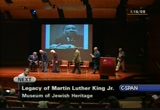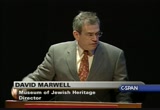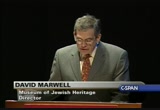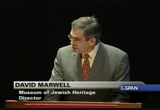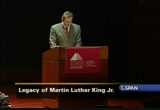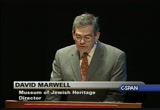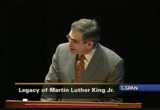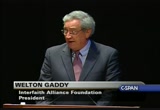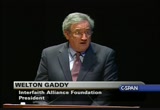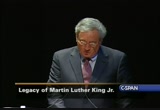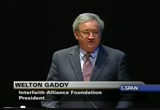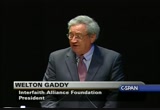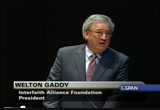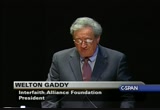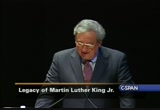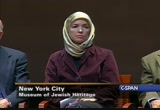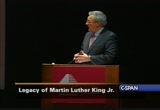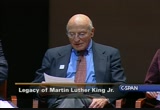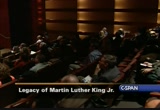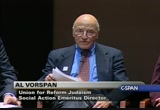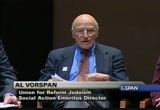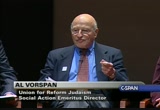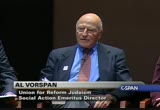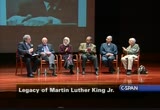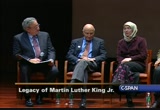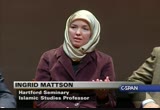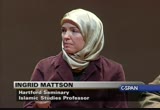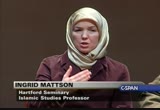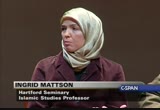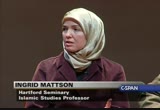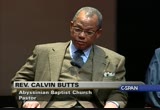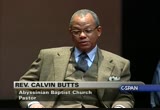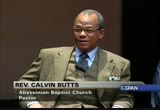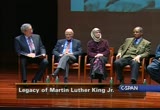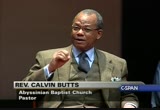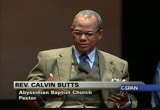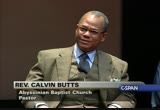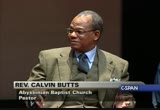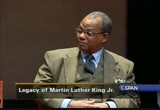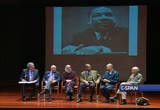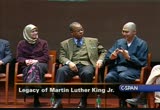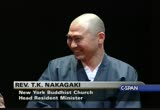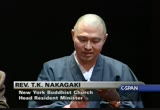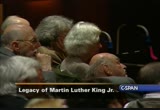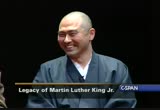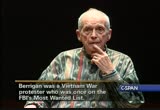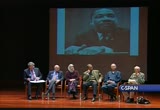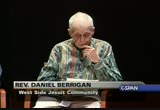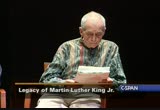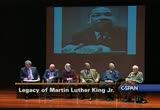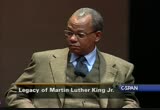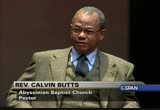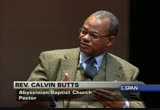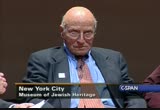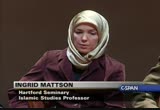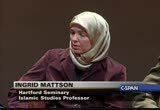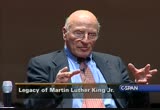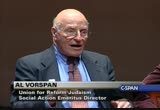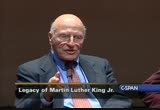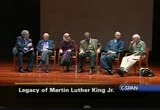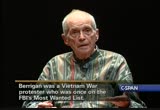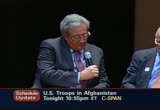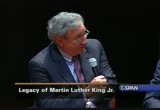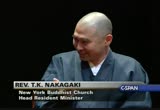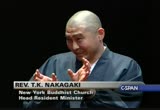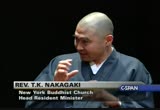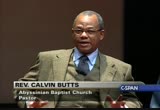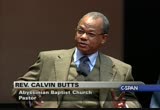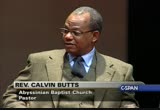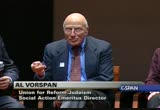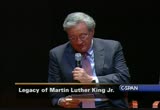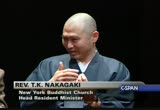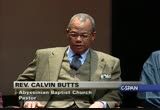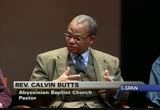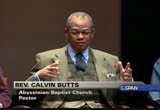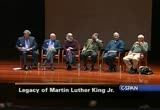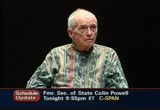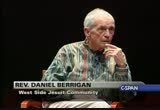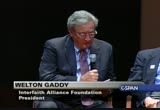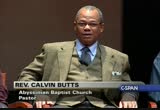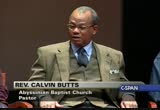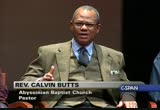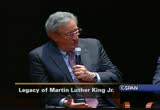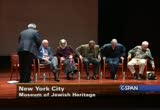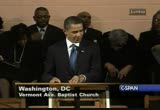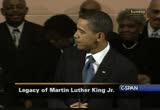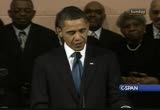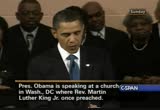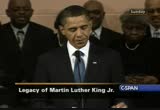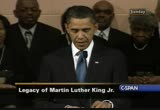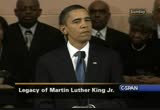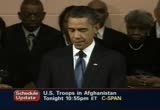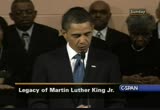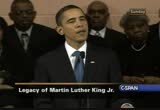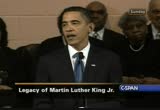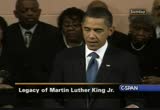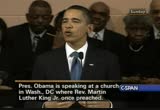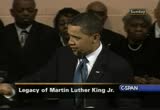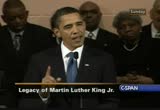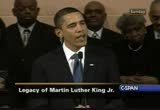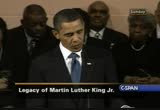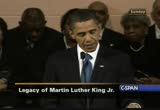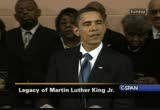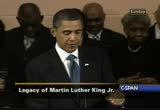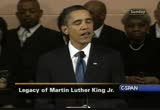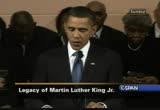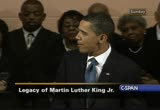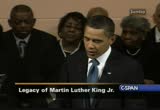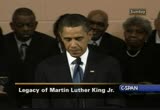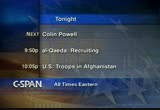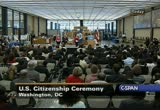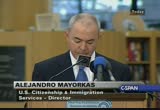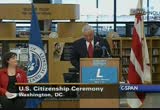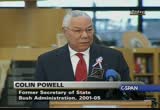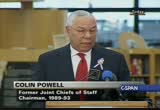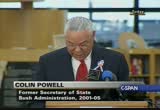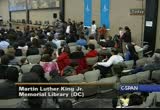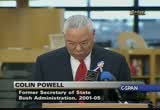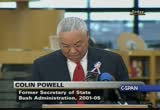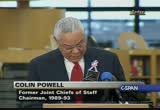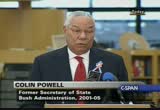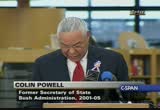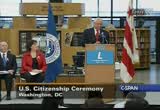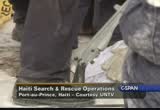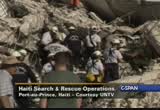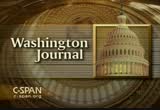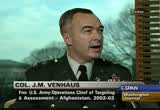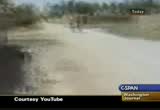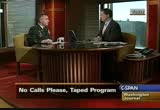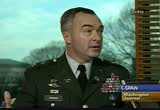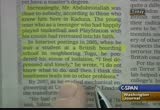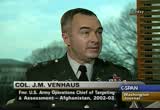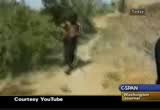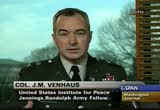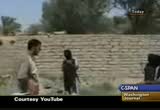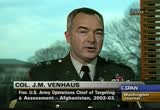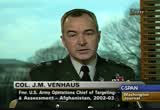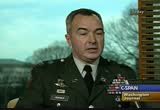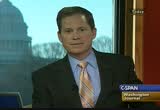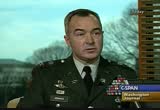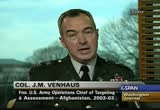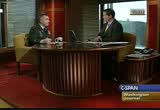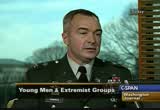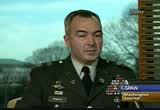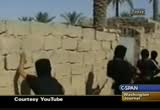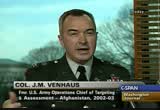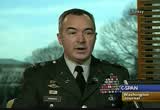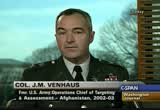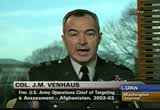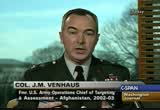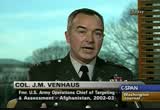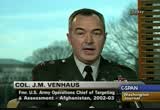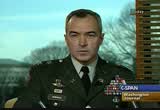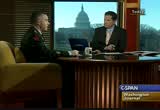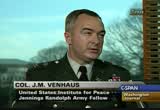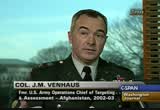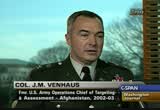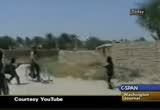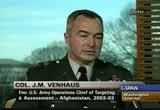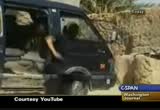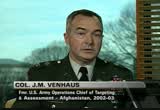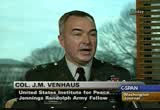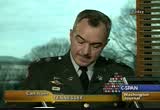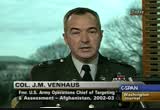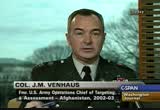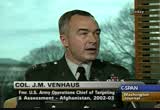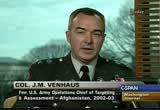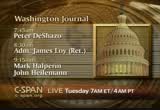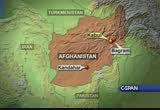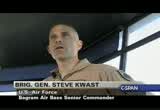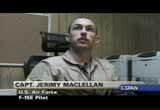tv Tonight From Washington CSPAN January 18, 2010 8:00pm-11:00pm EST
8:00 pm
luther king, jewish, christian, muslim, buddhist leaders lead a discussion on social practice and change. they also talk about the issues of justice and equality that inspired her own activism. this is one hour in 20 minutes. first, remarks from the director of the museum of jewish heritage. " good evening, ladies and gentlemen. i am very proud to be the director of the museum of jewish heritage. it living memorial to the holocaust. i want to welcome you this evening to what promises to be an extraordinarily interesting and moving program. i would like to remind you all before i began to do what i have forgotten to do but to turn off my cell phone. . .
8:01 pm
8:02 pm
they are complete -- and their complete biographies are contained in your program. after their discussion, they will be glad to take questions from the audience. please write your question on index cards that will be distributed to you. the museum is presenting tonight's program with the fifth alliance -- with the interfaith alliance foundation, which is committed to reforming the public. i want to pay special thank you to our former colleague for his
8:03 pm
help in arranging tonight's program. this program is dedicated to the memory is of dr. carolyn goodman, a civil rights advocate and a great friend of this museum. andrew goodman, her son, along with michael shorter and james chaney, in the summer of 1964, went to philadelphia, mississippi to register black voters. when they went to investigate the burning of a black church, they were arrested on false charges and eventually released into the custody of members of the ku klux klan who beat and murdered them. it took the fbi 44 days to find the bodies. a copy of the missing posters a permanent part of the museum's corings addition, reminding visitors of all ages and backgrounds that directions to matter and that none of us is free unless all of us are free.
8:04 pm
after andrews murder, his mother became synonymous with the civil rights movement, carrying on his work. she spoke annually at the museum in this very room to our gallery educators, inspiring them with a message of social justice and activism and reinforcing the importance of their work here in the museum. when she spoke to audiences in this year, she shared intimate details of her family life, like when she revealed that as an the pack for his trips out, she packed bandages in his duffel bag when he was thanot looking, just in case. dr. goodman is also a permanent part of kerkorian's edition. she can be heard on the museum's audio -- part of our core
8:05 pm
exhibition. she can be heard on the museum's audio recording. she relates that andy was 20 and needed his parents' permission to go. she and her husband were very anxious. but, in her words, "we thought, how in the world could we possibly say note to randy and not give him our permission? -- our permission?" she is dedicated to telling the story of these three young men. she was a guiding light and an inspiration to the staff at the museum and she is loved and missed. david goodman and his wife sylvia are here in the audience. david, would you stand a moment? [applause] now i would like to introduce
8:06 pm
dr. walton getty will get the discussion moving. [applause] >> thank you so much. thank you for being here this evening for what we know will be a stimulating discussion. the interfaith alliance is a national organization that considers individual rights and matters of personal conscience to be sacred. that is why we are both for faith and freedom. do to 13 years working to protect the integrity of religion and the vitality of democracy so they can flourish together. toward that end, we challenged religious and political extremist who seek an entanglement of the institutions of religion and government and
8:07 pm
that threaten individual liberties and legislators. in order to be moderating a discussion with this distinguished panel, i am profoundly grateful for the opportunity to work with the museum of jewish heritage, a living memorial to the holocaust, and i'm thankful for the invitation from the museum that made in this cooperative effort possible. some 40 years ago, dr. martin luther king, jr. said, "if we are to go forward, we must go back and read discovered those -- and rediscover those precious values that all precious liberty hinges on those [unintelligible] the values of which martin luther king spoken to the
8:08 pm
priorities of our society and into the world over are government without compromising the guarantee of liberty for all people regardless of their religion or their lack of religion. tonight, as we remember and celebrate dr. king's live, we will be compelled to respond to that demanding question. dr. king, like few other people, embodied an exemplary relationship between spiritual practice and social change. it transcended traditional divisions within the nation. that is why it is so fitting for this evening's panel to involve outstanding leaders from the jewish, muslim, buddhist, and christian communities. you have already been introduced to them and there is information about each of them in the
8:09 pm
program that you have been handed. the civil rights movement that dr. king champion was the perfect example of the positive and healing role that religion can and should play in public life. dr. king's sermons, speeches, and even his acts of civil disobedience inspired and unified the american people in the time that was marked by harsh divisions and a bleak and heat. from his work, -- and blatant hate. from his work, we have a lot to learn, especially in the midst of hotly contested primary elections involving deeply divided and seriously divisive partisan political campaigns. dr. king's dedication to his message of hope and justice was
8:10 pm
deeply rooted in his personal faith. but his message about faith resonated with all people of faith and goodwill, not just the members of his baptist fellowship. dr. king focused on four religious values that coincide with basic democratic values. his call to what -- to let freedom ring recognizes no exemptions, no conditions, no special preferences related to that freedom. it is little wonder that his summons to liberty echoes in temples and mosques and synagogues and churches of every variety. dr. king sought fulfillment for the big founding vision of our democracy, not the establishment of a sectarian
8:11 pm
religious ideology. dr. king's translation of spiritual practice into social change during the civil rights era stands in sharp contrast to the divisive and partisan tactics so prominent in our nation today. as martin luther king jr. spent two democrats and republicans the same way, his interest was not to curry favor, but to contribute to the common good. the issue was not partisan politics, but civil rights, not party loyalty, but social justice. dr. king was preeminently a religious leader. dr. king went to church regularly, not to be able to use religion to achieve a partisan political goal, but to allow
8:12 pm
religion to use him and to shake his involvement in pursuit -- and to shape his involvement in pursuit of change in the nation. his relations -- his religion shape everything else rather than letting everything else shake him. dr. king did not go to gallup polling to find his values or to the head of the republican national committee or the democratic national committee. his values and faith came from scriptures and conscience and need. the interfaith alliance was founded in 1994 to challenge those who would manipulate religion for narrow political gain. not surprisingly, we remain committed to advancing a
8:13 pm
positive policy agenda in keeping with dr. king's council that all reality hinges on moral foundations. to be sure, partisanship is a part of an election cycle. but our nation needs more than that. it is time for bipartisan coalitions of people of faith and goodwill to come together to tackle meaningful issues like hate crimes and racial profiling and basic protections for civil liberties. neither hidta nor bigotry qualify as either a religious is -- neither heat nor bigotry qualify as either a religious virtue or value. way it are challenging cabinets and other campaigns to remember the quality of dr. king's leadership. this man engaged in politics to
8:14 pm
improve life for all people. his goal was not winning an election so much as securing justice for everybody. his strategy was not dividing, but uniting. dr. king knew both the pressure and the price related to political endorsements. to his way of thinking, compromising his prophetic ministry was not worth the gains of declared partisan loyalty. dr. king never endorsed a candidate for public office. of course, religious leaders have to talk about politics. if we are to discuss public policy, we will do that even tonight. but never should we suggest that one candidate is god's choice for the leader of our nation or that one party has exclusive claims on our nation's spirituality.
8:15 pm
spiritual practice should never become a political strategy. it should remain the source of values that unite diverse people of all religious traditions and no religious traditions in facilitating social change that moves us closer to the vision of our founders and to the promise of dr. king's beloved community. you have already met the members of this panel. i am going to ask each of them to make an opening statement of about three minutes. that is a challenge in itself. and i want for you to talk about the nexus, the intersection, of your spiritual tradition and your social
8:16 pm
action. what is the relationship between the two in your personal life? >> we just heard a brilliant statement. i am ready to sign-on. speakers like us can drive a truck through the word "about" 3 minutes. speech to death is the jewish form of capital punishment. [laughter] we have great speakers here and i am going to try hard to make this brief and personal. i am old enough to have lived through a depression and i am
8:17 pm
old enough to have gone to jail with martin luther king. i am old enough to have fought in world war ii. i grew up in minnesota at a time when the twin cities were known as america's capital of anti- semitism. jews were discriminated against in everything, housing, jobs, education, public examination, it even service clubs and automobile clubs. you can imagine how blacks were treated in that society. that is one of the reasons that the record of america, with an administration beloved by youths, raised only a feeble voice against the holocaust. that was then. now, of course, the twin cities
8:18 pm
are among the most dynamic cities in america, a place where they have jewish said as -- jewish senators, and dozens of black [unintelligible] i just want to ask the question what happened? how did that happen? lots of things. the most significant for me was the powerful ties of the civil rights revolution which knocked down the closed society of my youth, knocking down the walls of segregation and discrimination, smashing quotas and apartheid, opening the doors of equal opportunity to blacks and jews and, ultimately, to women, two days, and to persons of disabilities. -- to dagays, and to persons of
8:19 pm
disabilities. the and before him had the moral clout that martin luther king had with my jewish community. i was at a convention of rabbis and martin luther king sent a telegram to the convention. "i need you tomorrow. i need you tomorrow in st. augustine, fla.." we didn't even know where that was. "we need you tomorrow." 17 people were on an airplane the next day. i was the next one. and martin luther king and to the question that we just asked. what was this all about? it was not just in justice. it was something profound and spiritual and moral that went to
8:20 pm
the root of our beliefs as jews and he invoked it in a way that was amazing to everyone of us. he made them act. within hours, because of martin luther king, we were all in jail. [laughter] we were in jail for the crime of sitting down and having lunch. that is what we were arrested for. we were sitting down and having lunch with fellow americans. we were turned over to the tender mercies of hans mukasey who was the chief of police and the leader of the ku klux klan of the county, the same guy. no other person could have evoked the kind of response from the people who were with me in the cell.
8:21 pm
no one else could have access to pull. why were we here? what is the answer? what does this mean? what was the significance? martin luther king was extraordinary. he was extraordinary anyway you don't see much today. to him, justice was a seamless web. it was not just what was happening to blacks. he was deeply outraged by it anti-semitism, and deeply our rights by racial profiling. he spoke out [unintelligible] he condemned antisemitism even when it came from black leaders, especially when it came from black leaders. martin luther king was a person of conscience and he was willing to face on popularity, even within the black community.
8:22 pm
i remember the riots, the intellectual and moral rights that broke out when he decided to come out against the war in vietnam because he felt in his judgment that it was wrong. but it was regarded by many black leaders in politics. that was dangerous to the community. martin luther king and boarded the conscience of america. -- martin luther king embodied the conscience of america. phase came later. martin luther king was as great a contributor to that as anybody i've ever met in my whole life. he died in memphis. but the conscience of martin luther king did not die. [applause]
8:23 pm
>> thank you so much for that. i realize that we have a television audience. i am going to tell just a sentence so that those of you and television can identify the others. al horseman is the director of social action emeritus for reformed judaism and the author of many books. dr. ingrid manson is a professor for islamic studies at hartford seminary. she is also the president of the islamic society of north america. ingrid, we hear you now. >> thank you.
8:24 pm
i certainly feel that i am surrounded by a judge today. i am humbled to be among these great men. you wrote a book about dance yourself. this wilthere will be an addendo that in the future. i am grateful for what you have done. tonight, we're here to remember the legacy of martin luther king, but it is important to be grateful and to show that appreciation for all those who made his work successful. it could not have been done alone. i'm very humbled to be here. when we hear you speak about being thrown in jail for eating at a lunch counter and being handed over to the head of the cooks clan, it isn't a magic -- it is -- the head of the coup cox clan -- ku klanux klan, is
8:25 pm
unmanageable. -- it is unimaginable. there would be a woman running for the president of the united states, that there would be a jewish museum in new york that has a place of prominence, and the people of all faiths are coming to it in humility and appreciation. for me, the relationship between faith and social justice hinges on the imagination.
8:26 pm
faith gives me the confidence that there are other things possible. there is a reality that is possible that is not fantasy, but it is aachievable with work and with a struggle. but it begins with a vision. i think that is why it is the first four words of martin luther king's famous speech that resonates mostly with us -- "i have a dream." to the will to say in that the reality that we are living in -- and when we're talking about social justice, we're not talking about simply change. it is not a question of changing one relationship or one law, but deeply affecting the social structure, economic structure, laws at all different levels,
8:27 pm
regulations, municipalities, counties, states, federal laws. how many changes had to happen in society 40 years ago for us to be where we are today? many people fall back into pessimism. they say it is impossible. it is impossible for things to change. people will never change. when i hear people discussing many of the problems that plague the muslim global community, i think things like hatreds that have gone for thousands of years. people will never change. that kind of pessimism things to me to a lack of imagination, whether secular or sacred. i get my confidence -- i get my courage and my strength from that belief that all things are
8:28 pm
possible with god. we are his instruments and his servants to make the change possible. there is a beautiful verse in the car on that says "perhaps god will put love in the hearts of those who you know consider your enemies." can you imagine it? what is interesting about the wording of this verse is that even those who you now consider your enemies. it is not who are your enemies, but it is a matter of perception. it is about passionate emotion, negative feelings, and even real struggle that is political, that may even be military, that in the middle of that, there is the possibility that one day you will be friends, not only
8:29 pm
france, but people with love for each other. you said before we began that, at the end of the second world war, you vowed to never speak to a japanese person, to always take them. that changed in you. how many of us, all of us, have had that experience, both individually and within the society? for me, that is the beginning point of a successful relationship between faith and social change. [applause] >> next, we will hear from dr. butts. >> mine is an inherited faith.
8:30 pm
my spirituality comes largely out of practice and worship and imitation of those who went before may, primarily my parents. i inherited the faith of my parents. they took me to church. they encouraged me in church. it was there, it in the worshiping experience of charge, primarily the sunday school, that i learned about god. in that learning, i learned a number of things, most important scripture. scripture said that one day the lion and the lamb with lie down together, scripture that said the land would flow with milk and honey, scripture that said
8:31 pm
one day every valley would be exalted and every mountain and hill made low. and i would hear that over and over and over and over again. one of the things that struck me about a rabbi from nazareth was that one of the scriptures that he quoted in the beginning of his ministry said that the spirit of the lord was upon new because it had anointed him to preach good news to the poor, the recovery of sight to the blind, to proclaim the favorite year of the lord, to let the broken victims go free. these things stuck with me because i heard them over and over. i heard them in the context of sunday school, in the context of worship. but they began to live for me in
8:32 pm
the person of martin luther king, jr. i interest to the notion of salvation -- i understood the notion of salvation through sacrifice. i would hear the scripture that you want to forgive 70 times. i would hear that you ought to love your enemies and pray for those who despite fully use you. i guess i would pick up the elements in the behavior of my parents and my relatives. but it was made very real in the life of dr. king. i was influenced heavily by any number of great profiphets. malcolm x, i read frederick
8:33 pm
douglass, harriet tubman, so many more. but dr. king was there. he was present. he was tangible, possible. i never touched him, but you know the miracle of television. [laughter] and i would sit in the living room and watched the marches. and then my mother went to the march on washington. i look for her in the crowd. i could feel the energy and i could hear the words of that profit, that brought by -- that prophet, that the rabbi. i saw pictures of the ku klux klan and they would say "i am
8:34 pm
going to get to commandeer -- i am going to get you, nigger." i would read about a man who had his brains knocked out. he was a unitarian minister. the three young men, a catholic lay woman -- i followed that and i would hear in dr. king and see him love your enemy, turn the other cheek. my god, he was living. heidi do that as a young man who is angry? -- how do you do that as a young man who is angry? you begin to understand more deeply this rabbi from nazareth
8:35 pm
and this man who is leading this nonviolent army. and then the ultimate, the devastation of it all, yet the great revelation and salvation of it all -- he is assassinated. the rabbi was nailed to a tree. his forerunner got his head cut off. then you say that there is no salvation without the shedding of blood. and i thought that the only thing about the non-violent movement that anybody could say was that it was anything but nonviolent. it was filled with bloodshed and hatred. yet dr. king's voice echoing that young rabbi, love your enemy.
8:36 pm
what? and he was assassinated. he was crucified. then i could not get it. my spirituality was shattered for a moment and i was angry. but the route was good -- the root was good. even though the flow or faded, it was going to bloom again. we could see that this was the development of deep spirituality. we see the crucifixion through the resurrection. i was trying to figure it out. then it comes back again. you can kill the dreamer, but
8:37 pm
not the dream. all the scriptures, back and your spirituality deepens. therefore, by the time i get to the ministry, i received a call and i know what i have to do based on my spirituality. bill weld, proclaim the lord, let the broken victims go free. what are your wages? you could get killed. but by then, your spiritual audacity is another rabbi. your spiritual audacity is so spiritually rooted that you're not worried about that anymore. you remember dr. king's words. i would like to live a long life. longevity has its place. but it doesn't really matter with me now because i have been
8:38 pm
to the mountaintop and i have seen the promised land. so with that phase, i go about doing what it is i feel god has called me to do in whenever arena i find myself. thanking god for the presence of a young rabbi who yet lister me and for the memory of martin luther king, jr. [applause] >> river and not the gawky -- rev. nakagaki. >> greetings, everyone.
8:39 pm
my tradition is buddhist. the part of nonviolence that he always used as something that l.a. is -- that i always knew. [unintelligible] he became the peacemaker. that was influenced by the boost, too. -- by the buddhist, too. part of the buddhist practice is to things. -- is two things. when is to cultivate wisdom and be able to see things, " is really going on. if you do not have eyes to see, you may have a problem.
8:40 pm
once you have such guyseyes, its not just your happiness, but everyone else becomes happy and then you become happy. the second aspect of buddhism is compassion, cultivating compassion. he practiced compassion as well. that part is really connected. i was that the university, and the buddhist university, and i belonged to the english-speaking
8:41 pm
suicide, some club -- english- speaking societe, some club. [unintelligible] "for reo last ," that part kit -- "free at last, " that part kept coming back to me. freedom itself is not just physical freedom that i think he is talking about. that is part of buddhism, too. your mind should be free, really. if you have the mind of anger, the anger itself does not do anything good in a buddhist sense.
8:42 pm
the mind and body and the words that we talk are very connected in buddhism. the action part is the body that we use. but what kind of mind you have is very important. i'll is to the speech of martin luther king and he is always coming of the mind of compassion. if you have the mind -- by this action, we bring happiness to all the people. then you really have an source of action to go with. if you have anger, that creates more anger. in terms of what kind of mind
8:43 pm
and do we have is a very important part of foodisbuddhis. [unintelligible] if washington can build the peace museum next to the white house, that would be good. [laughter] [applause] i have a dream. someday, we will establish a peace museum in this country so that people can appreciate the peace and practice the peace and i can think of my happiness and the happiness of others
8:44 pm
together. my point is, again, what kind of mind that you have to do any action. [applause] >> dr. daniel berrigan. >> i did a lot of thinking these last weeks of the topic of this evening. i thought of the haieirs of thee treasures transmitted to us. what does it mean to be unfair imposition of this heritage -- to be an heir imposition of
8:45 pm
8:46 pm
central park. her hosts -- she had this to say for her husband. >"he would have wanted me to be present today. but my heart is heavy with grief and having suffered an irreparable loss, my faith is stronger than ever before. i have suffered by an irreparable loss and my faith in a stronger than ever before." had he been here, he would have lifted your hearts and spirits to levels of understanding.
8:47 pm
i would like to share with you thoughts from my husband. he carried many scraps of paper on which he scribbled many notes for his speeches. among these notes was one that he never delivered. perhaps they were an early thought for the message u.s. to give you today. -- for the message he was going to give to you today. the shall not believe in a military victory. no. 2, and thou shall not believe in a political victory. 3, thou shall not believe that the vietnamese love us. the four, thou shall not believe that the present government has
8:48 pm
the support of people. 5, thou shall not believe that the majority of the south vietnamese look upon the viet cong as terrorists. 6, of that of shall not be the figures of kill the enemies were killed americans. seventh, thou shall not believe that the generals know best. 8, thou shall not believe that the enemies victory means communism [unintelligible] 9, thou shall not believe that the world supports the united states. 10, the shalt not kill. i am speechless all to your benefit. [laughter]
8:49 pm
i found myself so transformed with those lines. thank you. [applause] >> thank you so much. this is very rich material. we will have to move rapidly now. we have a few questions and you also have an opportunity to write down questions for me to raise as well. you were a student at morehouse in the 1960's. the understanding that you got to attend summer rallies and hear dr. king lecture. is no wonder that you were deeply moved by his death.
8:50 pm
what do you find it in the contemporary black community of the deep feelings that you have for dr. king? is that shared? is that feeding? what is his legacy in the african-american community today? >> i think his legacy is strong, but the deep feeling that i shared at that time, concerning his life and death, i do not believe, except for those who are in my immediate age range, older and just a bit younger, our shared today. many people of all races do not know who dr. king really was. the unconscious missionary faith of the west, materialism, has greatly influenced our society
8:51 pm
for the worst in the sense that, when dr. king -- when you know that dr. king died, he did not have a lot of money. when he risked all for the sake of humanity, social justice, that feeling in not just the african-american community -- let me say that strongly -- in most of our communities of any faith is just about gone. you have to remember something else that was very much a part of me and lots of my generation. i said that my faith was inherited initially.
8:52 pm
it was passed on to me. many of our young people today, far too many, do not go to synagogue, to church, to temple, to mosque. in the united states, that is. they really do not understand the depth of dr. king's spirituality and the spirituality of the young men and women who were with him in this black-and-white, of christian, jewish, muslim, all walks of lives. we are poor as a nation because of that. >> he lived just a few blocks from where the world trade center stood. one of the consequences of that day has been a rising fear of
8:53 pm
and a misunderstanding of the muslim community. i do not want to put words in your mouth, but is there something to be learned from dr. king in how the muslim community faces the situation today? >> absolutely. it is his legacy. his example is such a treasure for our community. there are many sad stories about our young people these days, the kind of discrimination they are suffering. our children are post-9/11 children. they're going through great hardship. they face harassment, discrimination and are called
8:54 pm
osama or terrorists or all sorts of names. this feeling of anger of being mistreated, of being unfairly targeted, is a natural emotional reaction and we need good role models. we need to give very young people an alternative to simple anger. i remember sitting with my son who is now 16 a few years ago, working with him on a project for martin luther king-jr. day. it was such a wonderful time to discuss these issues with him, to discuss his feelings of being picked on and to make sure that he did not become a victim. it is an enormously rich and powerful resource to us, his
8:55 pm
speeches for example, his role model. it is all the more powerful for us as a community because it is reflected in the examples of earlier prophets, including our own profit muhammed, after the persecution and murder of a very close family members when he was then in the position of power and declared an amnesty in the city of mecca for those who had persecuted his community. we have that example from our own religious history and spirituality and a very contemporary probable example that is so important for us. for that, i am so grateful to god, for giving us this great man. >> i would like to make two quick points.
8:56 pm
one, india fine martin luther king, i am as guilty as anybody. -- in the day of fighting -- in deifying martin luther king, i am as guilty as anybody. there were efforts by the government of the united states, j. edgar hoover, the fbi, the acquiescence of the government of the united states in seeking to destroy martin luther king. the argument then was communism. there is a guy next to him or near him who has been accused of communism. that was the government of the united states.
8:57 pm
it is difficult to say you wouldn't he would say. but i have no doubt what he would say about the iraqi war and the prosecution of innocent people because of their religious faith. he would be a very strong advocate of those constitutional liberties that are being eroded before our very eyes. that is one point. the second point, i am very grateful for what you said. but i am also very proud that your organization and my organization have entered into a programmatic relationship to deal with these issues, to reach out to people who respect tolerance and diversity and who are willing to fight the advocates of torture and harassment and pro-violence. one of the most important things
8:58 pm
that was ever said that the march on washington was said by a refugee from berlin. he said, ladies and gentlemen, there's one thing that is worse than bigotry. that is silence. that is silence. martin luther king would not be silent about the things that face us. >> father berrigan, i think your radical activism obviously grew out of your catholic spirituality. what has happened to the spirituality in the tradition and the other traditions that has left us seemingly without the kind of passion needed to address some of the very issues that we just heard mentioned?
8:59 pm
>> i do not think we have all night. [laughter] it seems to me that when the truth is in the air, even when it is not well received, we find new forms of sunlight and greecace to bring on a blossom d a harvest. the truth parishes underdress at the bottom of the social pyramid. -- under arrest at the bottom of the social pyramid. -- underdresunder duress at thef
9:00 pm
9:01 pm
we listen to a brilliant lecture on situations are around the world, all of which involve military conflict. i remember you raised your hand and asked, are there no alternatives? do you not have any alternatives to military conflict? and i have heard that i speak many times. i have never seen him stomped -- stumped.
9:02 pm
how easy is it for you to live in a nation that has a propensity for settling matters violently? >> it is certainly difficult. you get to eastern and western traditions, very different. there are eastern traditions, but in the west, you have to talk. [unintelligible] that is painful, really. but "about silence -- the quote about silence [unintelligible] but at the same time, talk is
9:03 pm
very important in eastern tradition, but that talks should be coming out of the silence. when you cannot stop the silence any more, then you talk. balance is very important in the east. for us, we do not say yes or no. this is right and this is wrong. nobody knows what is 100% right and what is 100% wrong. not knowing it, we know 80% yes, but they can be right 20% too.
9:04 pm
i am not pushing that i am right to, and justice is not the notion in the east. justice means that you are just, not the others. war in the eastern thinking is people saying i know the truth. that is the cause of the war. it is difficult for me to say what i think like anger and so forth. anger may be the forced to move something, but beyond the anger, you should have the mind of peace or love your neighbor, right? the reality is that you get anger. anger is one thing, and also in
9:05 pm
justice, but you need to have the base beyond anger. that we -- that is the foundation that we feel like is very important. >> someone is going to raise questions from the audits. while that is happening, what is your famer -- favorite memory of martin luther king, jr.? >> a while. -- wow. i believe that it has to be without question -- there are two. one, the speech and the march on washington. i was watching the television and i started out watching, i was lying down, and when it was
9:06 pm
over, i was standing straight up. and the second is something that i did not witness but i remember hearing. and i read. sitting in his kitchen after terrorists, if you will, attacks on his own, and he was wondering if it was worth it at all, and he felt like he was going to give up. the scene was a naked light bulb hanging over his bed, just him and got, and he said that that moment of deep despair and frustration and resignation, he heard the collective unconscious of his people speak in the words of the negro spiritual,
9:07 pm
sometimes i feel discouraged and think my work is in vain, but then the whole spirit revives my soul again. -- and then the holy spirit revise my soul again. and he got up and kept working. >> whoever would like to answer, please do it-you can. this may go on a long time. regarding the statement, the constitution is god's document, where does mike huckabee get aloff? how do we demonstrate no more tolerance of such lack of tolerance? >> you argue or debate or reduced what has been said -- or
9:08 pm
repeat what has been set. you try to say it as intelligently as you can. you would hope that god would give you words to respond, but certainly you feel that anyone has made a statement that is just so out of line with what you believe it and who you are, then you have to try to the best of your ability to say something about it. >> i think most of the statements about religion and faith in this political campaign, it does much more harm than good. as a person struggling with faith, i think that all of us are falling into a trap.
9:09 pm
what about the american who does not have faith? what about the religious test that has emerged in american life which means that no one can run for political office without faith? you have to present conscience in america, which leads to a repudiation of faith or doubt. as religious leaders, we are not affirmed a knock at the importance of that principle. -- we have not a firm to be enough -- affirmed in the the importance of that principle. >> how can we can contribute to raising the spiritual essence or consciousness?
9:10 pm
how can it be brought where people are not used -- where people are not wed to that particular view? >> i pass. >> the adsense is, how can we contribute to raising the spiritual essence or consciousness among our young people? go ahead. >> this is a and this is a light, and we never separated. -- this is faith and this is daily life, and we never separate it. [unintelligible] if you say that this is spirit and that, that might be problematic.
9:11 pm
in my case, i feel like it should not be separate. you understand the merit -- the meaning of life, and that is spiritual and the people to go to the church on a sunday service, but they are willing york -- really aware of that. >> on martin luther king day, the malls will be filled still mostly segregated. where is the hope? >> you cannot let secularization of the day like king's birthday or the celebration at his birthday destroy hope.
9:12 pm
hope is everywhere you see anyone, as trite and trivial as this may sound, anywhere you see anyone celebrating the day in terms of inspiring word just in general working toward providing a better quality of life for any human being anywhere. every profits has been destroyed -- every prophet has been destroyed and people thought that hope had died. and yet we continue to see the expressions of our faith and spirituality everywhere, it is an african-american running for president, or a woman running for president -- it is the fact that more and more people are
9:13 pm
beginning to be engaged and protest against this war -- in protest against this war. whatever it is. the mosqualls can fill all they want and you can sell cars, but hope springs eternal. and every time i turn around in today's world, with all the negativity, there is something that happens that says, ah, there is. it is a reason to keep on living, to keep on working, and we will see it. god is not finished. we will see somewhere, sometime, a major move of god that will confound the salt and say, wow, look at that. i never thought -- and people
9:14 pm
saw martin luther king jr. march, african-american, women, at a jewish person, gays in society, i never thought it would happen. but deaths, lynching, killings, but it happened. >> i was privileged to be one of your students. you will awaken my conscience by your deep ball all responses to the war and by your own actions. i have been waiting 40 years to thank you. how do we inspire students today? >> i have a little story in that
9:15 pm
regard. i was teaching at lincoln center as the war broke out. i had to recall my responsibility toward these young people. and i was led to reflect on the fact that the long lead -- long like i have led, not by precept, so i thought the best offering i could do is to do something about the war. and so we did. i spoke to them very openly that we were going to walk across manhattan's to the industrial center in times square and block the doors, and invited them along.
9:16 pm
most of them had never seen a scene like this before. it was an awakening. then they saw as a arrested and hauled away, and i spoke about that, but no one is never been in court. well come on and see how we are treated. it was boring and took most of that day. as class time approached, i said to them, we're not quite make class today. but if you're going back to college, i wish you would tell them what you saw today. getting the word out in some real way, not playing the guilty by standard -- bystander.
9:17 pm
they're writing began to change and they engage themselves in questions about conscience and violence and what kind of response would be fit for human kind. and they began to be arrested. and that i began to deal with their peers, and so did day, and with their parents, and so did they. and the circle widened. awareness and anger and acceptance, and it was quite a time. so that was a very simple minded way that -- offer something concrete about your own life as a legacy, it might be worthy of dr. king. >> i think anyone who wants to respond to this question, you are welcome to do it.
9:18 pm
is it random that martin luther king was african american, or is there something inherent to that culture of movement they gave birth to someone like him, could he have existed in another ethnicity at another time? >> absolutely. not only could they, they did. i talk that i gave which repeats some of the same said i did, profits, presidents, and poets. prophets talking about the beloved community, joshosea, amos -- these guys did not
9:19 pm
have a good time. and presidents -- thomas jefferson, no, he was not a keying ty -- king type. but we say god writes straight on credit lines. -- on crooked lines. he certainly did not come out of that tradition. across time in history and culture is, oh, absolutely. and dr. king, that is why i say, in the midst of the presentation of that speech on television and over the next few days, or any of his speeches, some youngster, god knows, from whatever religious background, humanistic background, is going, what?
9:20 pm
and here she is going to become engaged somehow -- and he or she is going to become engaged somehow and it will become an unbelievable sum of. and one more thing. we're talking about spirituality and how it enforces our social actions. and we think of spirituality in the sense of that which is good and motivating. but you cannot underestimate ever the power of evil. i think that as one people -- that is one thing that people do not want to deal with. when martin luther king got assassinated -- they shot them, and jesus was crucified, and we can go on and on. we talk about hope, and it seems like it is not around or whatever. and the evil that opposes us is not coming after rust and polite discussion.
9:21 pm
you think about hitler and what he was trying to do. this is overwhelming. and many people will not engage in the struggle because -- and act -- and anger is usually a mask for youfear. what you think about your kaine now? that was a phone call. we got martin luther king. he is dead. and that sent shock waves, because none of us in here is ready to die. if we understand that that is an expression of our sacrifice, then we have got it. >> i remember the conclusion to one of his sermons. i cannot say fully that i embrace it, but i tried. he ended a sermon of reflection
9:22 pm
saying, fear knocked at the door, faith answered. there was no one there. i started by quoting dr. king saying, in order to go forward we must look back. and rediscover our moral foundations of all significant social change. this evening, we have looked back in order to go for it. -- to go forward. and we have received great council from this wonderful panel. as we prepare to go, i hope you would join me in thanking them. [applause] [captioning performed by national captioning institute]
9:23 pm
9:24 pm
>> good morning. praise be to god. let me begin by thanking the entire vermont avenue baptist church family for welcoming our family here today. it feels like family. banking -- thank you for making us feel that way. to pastor wheeler, thank you so much for welcoming us here today. congratulations on jordan, denise -- [laughter] a k eigha cornet yet. michele and i have been blessed with and in that year this year.
9:25 pm
-- with a new nephew this year. maybe at the appropriate time we can make introductions. if jordan's father is like me, that will be in 30 years. that is a great blessing. michelle and malia and sasha and i are thrilled to be here today. i know that sometimes you have to go through a little fuss to have me as a guest speaker. [laughter] so let me apologize in advance for all the fuss. we gather here on the sabbath during a time of profound difficulty for our nation and
9:26 pm
for our world. in such a time, it soothes the soul to seek out the divine and the spirit of prayer, to seek solace among the community of believers. but we're not here just to ask the lord for his blessings. we are not here just to interpret his scripture. we're also here to call on the memory of one of his noble servants, the rev. dr. martin luther king, jr. and it is fitting that we do so here within the four walls of vermont avenue baptist church. hear, the church that rose like a phoenix from the ashes of the civil war, here in a church formed by freed slaves whose founding pastor had won the
9:27 pm
union blue. here in a church whose pews set out for marches, where the and thumbs of freedom were heard, where king himself with sermonize -- would sermonize from time to time. one of those days was thursday, december 6, 1956. were you are routed at that point? [laughter] you or three years old. all right. i was not born yet. on thursday, december 6, 1956, and before he took this to the mountaintop and told us about his dream, king came here is a 27-year-old preacher. he spoke on what he called the
9:28 pm
challenge of a new age. the challenge of a new age. it was a period of triumph but also uncertainty for dr. king and his followers. just weeks earlier, the supreme court had ordered the desegregation of montgomery's buses. a hard fought victory that would put an end to the 381-day bus boycott down in montgomery, alabama. and yet as he rose to take the pulpit, the future same -- still seem daunting. it was not clear what would come next for the movement dr. king lead. it was not clear how we were going to reach the promised land. because segregation was still rife. lynchings were still a fact.
9:29 pm
the supreme court had also ruled on brown v. board of education, but it was not the rule throughout the south by school and by states. they ignored it with impunity. here in the nation's capital, the federal government had yet to fully align itself with all laws on its books and the ideals of its founding. it is not hard for us than to imagine that moment. we can imagine folks coming to this church, happy about the boycott being over, and we can imagine them coming here concerned about their future. sometimes second-guessing, biting off creeping doubts, perhaps to sparing about whether the movement in which they placed so many of their hopes, of movement in which they believe so deeply could
9:30 pm
actually deliver on its promises. so here we are, more than half a century later, once again facing the challenges of a new age. here we are once more marching toward an unknown future. what i call that joshua generation, to their moses' generation, the great inheritors of progress paid for with sweat and blood, and sometimes life itself. we have inherited the progress of unjust laws now overturned. we take for granted the progress of the ballot being available to anybody who wants to take the time to actually vote. we enjoy the fruits of prejudice and bigotry being lifted slowly, sometimes in fits and starts, but irrevocably from human hearts.
9:31 pm
it is that progress that made it possible for me to be here today. for the good people of this country to lead to an african american the 44th president of the united states of america. -- to a lelect an african- american the 44th president of the united states of america. some suggested that we had entered into a post-racial america parade all those problems would be solved. there are those that argued that because i spoke of a need for unity in this country, that our nation was somehow entering into a period of pool -- a post- partisanship. that did not work out so well. there was a hope shared by many that life would be better from the moment that i swore that up.
9:32 pm
of course, as we meet here today one year later, we know that the promise of that moment has not yet been fully fulfilled. because of an era of greed and the responsibility that so this season of its own demise -- s owed the seeds of its own demise, because of the banking crisis that brought the financial system to a break a catastrophe, we are be test -- we are being tested in our own lives and as a nation. unemployment is at its highest level in more than a quarter of the century, know where higher than in the african-american community. homeownership is slipping. beyond our shores, our sons and daughters are putting two wars. closer to warm -- closer to
9:33 pm
home, our haitian brothers and sisters are desperate, bruised, battered. many people are legitimately feeling out -- oudoubt, even despair. people are wondering where do we go from here? i understand those feelings. i understand the frustrations and sometimes angered that folks feel as they struggle to stay afloat. i get letters from folks around the country every day. i read 10 a night out of the 40,000 that we received. they are stories of hardship and desperation in some cases, pleading for help, i am about to lose my home, i do not have health care, it's going to cause my family to be bankrupt. sometimes you get letters from
9:34 pm
children, all mama or daddy has lost their job. 10 letters like that day, every day a week. yes, we are passing through a hard winter, the hardest in some time. but let's always remember that as a people, the american people, we have weathered some hard winters before. this country was founded during some harsh winters. the fisherman, the laborers, but craftsmen who made camp at the valley forge, they had a hard winter. the slaves and free man who wrote the underground railroad seeking the light of justice under the cover of night, they weathered a hard winter. the seamstress who speak were tired, the pastor whose voices -- whose voice echoes to the
9:35 pm
ages, they weathered some hard winters. it was difficult to sometimes see spring come. they to help their hopes -- they also felt their hopes to play. but each year the cold recedes, the sun reappears. so it was earlier generations and so it will be for us. what we need to do is just ask what lessons we can learn from those of earlier generations about how they sustain themselves during those hard winters. how they persevered and prevailed. let us in this joshua generation learned how that moses generation overcame. let me offer a few thoughts on this three first and foremost, they remain to resolve -- firm in their resolve.
9:36 pm
despite sniper fire were bombs or spitting, they adhere to that sweet spirit of resistance. the principles of nonviolence that accounted for the success. second, they understood that as much of our government and our political parties have betrayed them in the past, as much as our nation itself had betrayed its own ideals, government, if aligned with the interests of its people, can be and must be a force for good. and so they stayed on the justice department. they went into the courts. they pressured congress. they pressured their president. they did not give up on this country. they did not give up on government. they did not somehow say government was the problem but that we were going to change government and make it better. perfect as they -- imperfect as it was, they continued to
9:37 pm
believe in the promise of democracy, america's constant ability to remake itself. third, our predecessors were never so consumed with the radical debates that they could not see progress when it came. sometimes i'd get a little frustrated when folks just don't want to see that even if we do not get everything, we're getting something. [applause] no, king understood that at the segregation of the armed forces did not in the civil-rights movement because black and white soldiers still could not sit together at the same lunch counter when they came home. but he still insisted on desegregating the armed forces. that was a good first half. even as he called for more. he did not suggest that by the signing of the civil rights
9:38 pm
act, somehow all discrimination would end, but he also did not think that we should not sign the so rights act because it did not solve every problem. let's take the victory and then people marching. forward steps, large and small, were recognized for what they were, progress. before, an appeal to conscience tug the hearts and open minds, a commitment to universal ideals of freedom and justice and equality, and it spoke to all people, not just some people. kaine understood that without broad support, any movement for civil rights could not be sustained. that is why he marched with the white autoworkers in detroit and the mexican farm workers in california. the united people of all colors and the noble quest for freedom. king over came in other ways as
9:39 pm
well. a map -- he remains strategically focused on gaining ground, understanding that change would not be easy, would not come overnight, understanding that there would be setbacks and false starts along the way, but understanding in 1956 that we can walk and never get there because we know that at a great meeting at the promised land of freedom and justice, because the moses generation overcame is that the trials that we face are different than previous generations. even after the worst recession in generations, like in america is not even as close to being as brutal as it was back then for so many. that is the legacy of dr. kaine, that is our inheritance.
9:40 pm
-- of dr. king, that is our inheritance. we must face them squarely as they faced the challenges they saw. i know it has been a hard road we have traveled this year to rescue the economy, but the economy is growing again. the job losses have finally slowed. around the country there are businesses and families beginning to rebound. we are making progress. i know it has been a hard road that we have traveled to reach this point on health reform. believe me, i know. under the legislation i will sign into law, insurance companies will not be able to drop you when you're sick. and more than 30 million people will finally have insurance, more than 30 million men and women and children, mothers and
9:41 pm
fathers. they will not be worried about what might happen if they get sick. this will be at victory not for democrats, but for dignity and decency and for our common humanity. it will be a victory for the united states of america. let's work to change the political system, as imperfect as it is. i know people fill doubt about the way things are going here in washington sometimes. it is easy to get up on the political process, but we have put in place rules about lobbying and transparency, tougher rules than any administration in history. it is not enough but it is progress. don't give up on hope for advocacy or activism. they're too many needs to be met and too much work to be done. like dr. king said, we must
9:42 pm
accept finite disappointment but never lose infinite hope. but as broaden are caught -- coalition, building a confederation of liberals or conservatives, of red states for blue states, but all americans searching for better tomorrow. the urgency of that our demands that we make common cause with all americans, white, black, brown, all of whom are being hammered by this recession, all of whom are yearning for that spring to come. it demands that we reach out that those left out in the cold even when the economy is good, even when we are not in recession. the youth in the inner cities, the youth here in washington, d.c., people in rural communities who have not seen prosperity reach them for a very long time. it demands that we fight discrimination in whatever for
9:43 pm
if they come. that means we fight discrimination against gays and lesbians, and we make common cause to reform our immigration system. and finally we have to recognize, as dr. king did, that progress -- progress cannot just come from without but from within. and over the past year, we've made meaningful improvements in the field of education. we have a terrific secretary of education, arne duncan, working hard in the d.c. school district, insisting on accountability. we've provided for more pell grants and tax credits. we have done all of that but parents still need to parent. kids still need to own up to their responsibilities. we still have to set high expectations for our young people.
9:44 pm
folks can simply look to government for all the answers without also looking inside their celselves. progress will only come if we promote that sense of responsibility and our own lives. sometimes when i say these things, people say that he is just talking to black people about working hard. no, i am talking to the american people because somewhere along the way we as a nation began to lose touch with some of our core values. you know what i am talking about. became enamored of the false profiphets, paying with credit cards, get rich schemes, and the most important thing was to be a celebrity. it does not matter what you do as long as you get on tv.
9:45 pm
that is everybody. we have forgotten what made the civil-rights movement a success and what made the united states of america a success. in this country, there is a substitute for hard work, no substitute for a job well done, no said -- no substitute. we're called to do -- we are called to rebuild america from its foundations on up. we invest in the essentials we have neglected for too long, like health care, like education, like a better energy policy, like basic infrastructure, like scientific research. our generation is called upon to block of down and get back to basics. -- buckle down and get back to basics. we must do this for our children and their children. for jordan and for austin.
9:46 pm
it is a sacrifice we are called upon to make. it is a much smaller sacrifice than the moses generation had to make but is still a sacrifice. it is hard to transition to a cleaner energy economy. sometimes it may be inconvenient, but it is a sacrifice that we have to make. it is harder to be fiscally responsible when we have all these human needs that we are inheriting, but that is a sacrifice that we are going to have to make. it's easy after a hard day's work to put your kids in front of the tv set. you're tired. you don't want to fuss with them. instead of reading to them, but that is the sacrifice we must with fully accept. sometimes it is hard to be a good father and a good mother. sometimes it is hard to be a good neighbor or a good citizen,
9:47 pm
to give up time and service of art -- and others, and call to honor dr. king. but these are sacrifices that our faith calls us to make. our faith in the future, our faith in america, our faith in god. in his sermon all those years ago, dr. king quoted appellate. truth forever and behind the dam on known stands got within the shadows keeping watch upon his own. victory in the past and uncertainty in the future, he trusted god. he trusted the guy would make a
9:48 pm
way, away for prayers to be answered. a way for our union to be perfected. a way for the ark of the moral universe to slowly bend toward truth and freedom and justice. he had faith that god would make a way out of no way. folks asked me sometimes why i look so- calm. all this stuff coming at you? how come you seem calm? and i have a confession to make. there times when i am not so calm. reggie love knows. my wife knows. there are times when progress seems to slow.
9:49 pm
there are times when the words spoken about me hurt. there are times when it feels like all these efforts are for naught, and changes so painfully slow in coming. and i have to confront my own doubts. but let me tell you, during those times it is faith that keeps me calm. it is faith that gives me peace. the same faith that leads the single mother to work two jobs to put a roof over her head, when she has doubts. to have a father said the job applications, after he has been rejected some many times. even if the first nine children
9:50 pm
she teaches, she cannot reach, the 10th one she is going to be able to reach. the same fatith song by haitian community. faith in things not seen. better days ahead. him who holds the future and the hollow of his hand. the fayed that lets us mount up on wings like eagles. that lets us run and not be wary. but as what cannot fate. -- lets us walk and not faint. joshua held fast to the faith of his father's, and together we shall overcome the challenges of a new age. together we shall see the promise of this moment, and together we shall make a way, and we will wake -- we will meet the spring.
9:51 pm
through got all things are possible. -- through god all things are possible. made the memory of martin luther king continued to inspire our world and all who inhabit it. may god bless the united states of america. thank you very much, everybody. may god bless you. >> colin powell spoke at a ceremony in washington. and then a look at how al qaeda recruits people into their organization. after that, fighter pilots talk about their mission in
9:52 pm
afghanistan. >> did you know that one of the top three apps is c-span radio? now you can get access to free streaming audio channels. there is also a tab with links to all of our podcasts, including "q&a" and "after words." >> on this martin luther king holiday, colin powell spoke at a ceremony in washington. following his remarks, 81 people took the senate this -- citizenship oath, also known as the oath of allegiance. this is 15 minutes. >> good afternoon. my name is alejandro mayorkas,
9:53 pm
and i represent the men and women who are here today and around the world who have worked so hard to help make this day possible. in a minute and a unique individual will stand before you to share his thoughts about this special day in your lives and in the lives of our country. he was our nation's 65th secretary of state, the 12th chairman of the joint chiefs of staff, the national security adviser to president ronald reagan, and the recipient of numerous military and civilian awards, including two presidential medals of freedom, and the congressional gold medal. in his 35 years of service in the united states army, he rose to the rank of four-star general. general colin powell comes to this lectern representing a great journey, one that stretch as far back in time and also
9:54 pm
reaches into a better tomorrow that he helped make possible. it is a journey that speaks to the power of character and hard work and of our natures -- nations promise of opportunity. it is a journey that in this country began decades ago when his parents arrived as immigrants like you and me. it is my privilege to welcome general colin powell the lotta's us today with his presence. -- who honors us today with his presence. [applause] >> thank you very much for your kind words and i wish you all the best as you continue with the important work that you will be doing for those trying to reach our shores, and especially for those in haiti who are suffering today. it is a great pleasure to be with you all today and i am especially pleased to be here to
9:55 pm
celebrate the 81st birthday of dr. martin luther king, jr. as we fittingly refresh our nation with 81 new citizens, not just citizens of the united states, but of the state that i actually live in now, the state of virginia. i know that we all have in our minds this afternoon the tragedy that occurred in haiti last week, and our hearts and prayers go out to those who have suffered terrible losses and who are now in need of our help. i am proud of the response that the american government and the international community has extended to the people of haiti, but much more needs to be done. it will take a long time to restore stability and to give -- get haiti back on on its feet. all of us have an opportunity to help in this regard by donating money to the many relief efforts. all of these efforts working so
9:56 pm
hard to help the haitian people. our new citizens, i know, will do what they can to help those in need. dr. martin luther king, jr. was a leader of the forces of freedom and equality in america's second civil war. racism, said her cousin, and the oppression of african americans did not end with the end of the first civil war in 1865 and the passage of the 13th, 14th, and 15th amendments. and the decades that followed, segregation and the separation of races was enforced by law and by practice. slowly over the long years, the inconsistency of these policies with the sacrifices made in the civil war and a clear mandate in our back correlation of independence that all men are created equal forced america to look into a mirror to see that
9:57 pm
the ugly image of america that was in that mirror did not reflect the america we wanted, did not live up to the dreams that our founding fathers had. we needed another civil war, at this time not by what one on the battlefields of virginia, but the battlefield of ideas and values and protests, to shatter that image and create a new reflection of our hopes for a more perfect union. revolutions need leaders. leaders prepared as our founding fathers were to pledge their lives and fortunes and sacred honor to achieve the goal. there were many such leaders and our second civil war, none > dr. martin luther king, jr. he was a man for all seasons, for all people. the dream he had for america was i dream he had for the entire world. in the shadows of the oppressed people of the world, any where
9:58 pm
his name was spoken, the light would shine. anywhere his words were repeated, prayer is were answered. anywhere he was steady, "began to grow. he was a hero for the ages. few men and women have ever had such power for good. a national holiday that we're celebrating today is a great tribute to dr. king, but he would be prouder still to note that this holiday has become a day of service as we can see in the activities taking place outside this library and the streets of washington, d.c. under his leadership the second civil war was won. americans aren't so much better place, that in a few minutes we will welcome all of you. were he here today, however, he would tell us that there is still more to do. we must continue to struggle
9:59 pm
until every american has the potential to live his or her old -- own dream. the 81 candidates before us today are marching to their dream. they are about to participate in them remarkable ceremony, remarkable because there is no other country on the face of the earth were such a diverse group of men and women, natives of faraway lands, can come together to swear their allegiance to a new nation that will become their home forever. we see before us three dozen such individuals, all home who will become american citizens. there is no other country in the world that has so opened its arms to embrace the dreams and aspirations of humankind. america is and nation of nations. we touched every nation and every nation touches us in return. this is our history. this is our tradition. this is the source of our
10:00 pm
strength. this is what makes us such a vibrant country and a leader of the world that wants to be free. america's greatness has been achieved by a wave of immigrants that have come to this land over the past 400 years. america has been enriched by the talent, but culture, the skills, the languages, and the values that came here over the centuries in the person of our immigrant citizens. it is this joining together of the first people that has also made a so durable and resilience as society, it just as a bridge cable gets its strength from its many strands of wire woven together for a common purpose. in pursuit of our common purpose, you are not asked to abandon your origin or ignored the ties and that entities that you have to your native land. you will keep your roots, and from them get nourishment to this new land of yours. nowhere else on earth can this
10:01 pm
10:02 pm
married in new york city and had a wonderful marriage until they both met their fates and went on to live with scott. it was fun to watch them as i grew up in this immigrant family of mine. it was fun when we got into arguments and i would watch and smiled as my mother would and the argument by whispering under her breath, man who did not finish high school. that was her ultimate put down. it was amusing to us. they had two children, want who became their successful as a teacher and one who went on to be a soldier. in one generation, the hopes and dreams of my immigrant parents were met and surpassed and so it has been over 200 years and glorious cycles, another of which begins this afternoon here in this library named for a man
10:03 pm
who is smiling down on the affirmation of america's purpose. the oath you are about to take will require you to assume the responsibilities of citizenship. you'll be asked to support and defend the constitution of the united states and announce your allegiance to your native land. beyond these requirements are other obligations that come with citizenship. to raise strong families and children that will become our next generation of leaders, builders, and keepers of the flame of liberty. to work hard to support yourself and your families and to contribute to the common needs of the nation through your generosity and by being good citizens. to participate in the political process actively. the process that fuels our to the credit system. first of all, to invoke those who will uncovered -- to invoke those who will cover you. this is one of the great responsibilities of the citizen. to keep yourself informed about
10:04 pm
the issues of the day. if to read and watch the news pushed to listen to arguments you hear on television and read about in newspapers. we must give our informed political sense to our leaders. join and participate in your community. joint the teachers association. join your school board. go to a place of worship. never heard association. run for political office if that is your inclination. be a good neighbor. give some part of your time, talent, and treasurer for those who are in need in your community. what we want most of all and what i suspect we already have this for you to love america and to be proud of being american citizens. pursue your dreams, take care of your new country, trouble in your american journey. the model of the united states,
10:05 pm
10:07 pm
10:08 pm
organization. -- a look at how al qaeda recruit young people into their organization. the jennings house army fellow. he was in charge of targeting and assessment in afghanistan. he is here to talk about how young men become extremists. what is the number one factor in a young man becoming a muslim extremist? guest: the most important thing we need to understand about how these young men are attracted to an extremist movement is it starts early. there are some myths, that is economic, has religious factors, but you have to look back at their bases of what they desire as they come of age, as they start to define themselves.
10:09 pm
the search for identity. who am i, as a person? the search for that vector-less energy makes it possible for the base of what a young man feels, to make al qaeda appealing, because he does not have other choices. host: we are not talking about women being recruited are we? guest: not as much. there are a very limited number of young women involved in al qaeda. if the primary reason of that is not necessarily because they have different motivations but they have significantly different opportunities. all lot of these young men find
10:10 pm
themselves isolated in a society that they do not understand, that does not understand them. with travel limitations on women, it is hard to get away from their communities can be isolated. it is harder for them to feel like they are a fish out of water. -- communities and be isolated. host: colonel j.m. venhaus is with us until 9:15 the stern. democrats, 202-737-0002. republicans, 202-737-0001. independents, 202-628-0205. we will get to your phone calls momentarily. since 2001, how has al qaeda's recruitment effort to change?
10:11 pm
guest: the most important when they have changed is the way have redefined itself as an international brand. al qaeda is much less of an organization today -- structurally -- and much more a brand identity. it is almost like a product brand, a brand that people want to belong to. some people say that al qaeda's greatest strength is its myth. it does not recruit so much that it creates a brand where people look to it and say, that is what i am looking for. i was confused, i did not know who i was or how i fit into the world, and this seems to be a great explanation. it is a sense of belonging.
10:12 pm
al qaeda is a great group because they provided that, the benefits of membership into something that gives you prestige. al qaeda has gone from being active on the street-type of recruiting to creating a brand, creating something that people can aspire to. host: in terms of personalities, the flight 253 subset -- suspect, abdulmutallab, he was close to a nobody.
10:13 pm
is that typical? guest: absolutely. he is a young man searching for something. he does not understand how he fits into the world but he wants to isolation is a huge factor. -- but he wants to. isolation is a huge factor. host: but there are plenty of young people who feel isolated. what is the step in between? guest: opportunity. if i am a young man looking for a group to belong to and there are 10 groups, i could choose any one of them. if i am a young man who is isolated, looking for a group to belong to, and all that is presented to me, or the most appealing thing is al qaeda,
10:14 pm
then that looks like the best choice. some people say that if you have a hammer, everything looks like a nail. well, if everything around you well, if everything around you looks like a nail, >> would we see youth gang violence. it is not so much the young people being drawn to a gang our that fundamentally different from those in the chess club with the marching band, they did not have the opportunity to be long. host: we have a caller waiting. caller: thank you for taking my call. i wanted to address one aspect of the conversation that i think has been missing as of late. when you think about how over
10:15 pm
80% of the world's resources are those that come from outside of america, you understand how people in those areas are disenfranchised and get upset when they are not able to benefit from those resources in the land that they live right on. when there is a small minority of the world population that controls a large majority of the resources, that is the problem. i do not want to focus specifically on al qaeda, the disenfranchised and men around the world are rebelling because they realize that they cannot benefit from the resources that are plenty in your area but those are taken by force. that is what made people
10:16 pm
mobilize against the invading forces. that is a large part of the problem. a small minority of the world population controls a large percentage of the resources. host: we appreciate your call. guest: you hit on an excellent point about one of the myths associated with al qaeda recruitment. what we have done over the last year is a study about two dozen young men who had come to extremism. we look at the cases of these 2000 who made the decision to jump into a and extremist organization and try to trace back word to the point where they made the decision to join. they learned about exploitation of resources and they learned that tens of disenfranchisement
10:17 pm
that we talked about throughout the process. that was not what drew them in. you have to go further back in their development to figure out why they joined because you have to know what motivated them to look for something. once they walk into a mosque and a hear about jihad, they get a lot of information about the world that they did not have. a lot of it is skewed. but that is after they made the decision to cross the threshold. that is not the motivator that got them to the front door. so the exploitation of the world's resources is an argument used by them in the indoctrination process, but it is not so much a part of the recruitment process. host: s.i.. -- staten island.
10:18 pm
caller: thank you for your service. i keep on hearing the term al qaeda. are they the only extremist group we have to be concerned with? is it also not the fact that this is a conception of the policies that we have? for instance, iraq. is it not possible that some of them -- even if i do not agree with their actions -- [inaudible] guest: other than al qaeda, yes. there are lots of associated movements. all data has become more of a
10:19 pm
blanket term, not necessarily for any specific organization, but for that brand that i talked about. the violent extremism rooted in ideology that goes by several names in different places. in many of those other places, any of the other associated movement, the adult -- ideology can be the same because the appeal is the same. the escalation of status, sense of belonging to a group that they find in these kinds of groups. in some cases, as we saw with porticoed, -- for food, people who have never been associated -- fort hood, people heawho have
10:20 pm
never been associated with a group. in terms of our policies, do they turn them against us? in some cases, yes. some people in the world are against that, and because of that, i want to speak an angrily about that. what a change in policies change the fundamental nature of the argument? not entirely. there would still be people willing to speak angrily against the policy. host: a skeptical view from one of our viwerewers -- as she underestimating al qaeda?
10:21 pm
guest: she is alluding to the fact that there is a change in the way al qaeda operates. when al qaeda was a network -- a part of the movie had been -- mujihadeen network, it is a different al qaeda that directly threatens the united states. it has made statements since that time in afghanistan when it was referred to as freedom fighters on behalf of the afghan people, made statements about its global operations. it has gone from localized movement with a political cost to a globalized movement with a completely different political cause. host: colonel j.m. venhaus.
10:22 pm
maryland. republican line. caller: i think when there are a lot of young men with nothing to do, they will find something to do to get them in trouble. don't you think employment is a problem? guest: what i found in the men that i studied it is the vast majority of them came from middle-class and upper-middle- class upbringing. unemployment was in frequently cited. when i first went in, i thought the same thing. the truth is, more often than not, they are employed.
10:23 pm
i read an interview with one of the saudis who crossed over into iraq who said i was about to get promoted in work, but it did not fulfil the, so i look for something else. i think the basic motivation is more about what he was looking for them it was about having a job or not. there was talk about al qaeda promising money to fighters. when someone makes a decision to leave their jobs, their home, a relatively peaceful environment, toward the conflict zone, almost never is it because of the pay. suicide bombers cannot get paid well. it never has. when you talk to the young men who joined the cause, they are not looking for money for themselves, their families, or anything like that. it is, i had no meaning.
10:24 pm
can you get meaning and fulfillment from a good job? of course you can. having any meaningful job is more important than just having a job. when you look at the countries across the middle east, where the foreign fighters are drawn from, we see unemployment rate that vary from 2.2%, all the way up to 40%. those statistical correlation between unemployment and the number of foreign fighters that that country generates. statistically, the data doesn't support that. however, having for unemployment conditions in a country that to the argument. host: you mentioned those 2000 individual that you studied.
10:25 pm
is this part of your work with the u.s. institute of peace? guest: yes, this is work that i started in the centcom region. that was followed up by a collaborative effort by the u.s. army war college. one year of fellowship where i can take my field experience reviewing the information about born fighters -- foreign fighters, with a year of intensive study looking into more cases, more information, and as we see every day, more and more opportunities to study that. host: is this the largest study to date of radicalization? guest: i have benefited from a lot of people who have done great research and similar
10:26 pm
studies in radicalization. i do not know if this one is bigger or if i have just compiled a bunch of them together. for me, the benefit is, before i had to do academic research, i have to do military research that gave me access to information that is not money available to academics. i was able to look at classified reports as well as on classified data that came out from academic research. my sample size has benefited as a result but i cannot say that mine is the biggest or the best. host: you have also done research on the issue of child soldiers. how big of a problem is it, what countries specifically have this problem? guest: one of my distinguished
10:27 pm
colleagues at the institute of peace the some great work about children in conflict zones and how that prevents them from reaching adulthood. the complex around in -- conflict surrounding a young man is fundamental to his outlook in the world. we approached the research from two angles. you look at young men in conflict zones, what it does to them, and i am looking at these young men of sign of conflict known to seek them. child soldiers it is a significant problem. they mostly stayed in their home countries and become a problem for their home country.
10:28 pm
host: cold water, michigan. pete on the republican line. caller: i have a couple of questions. i wonder what the colonel had to say about people who say the u.s. government was involved in 9/11? guest: i do not believe that. simply stated. the 9/11 commission published an excellent report on that. people say a lot of things that i do not believe. host: have some of those views been expressed by these individuals that you have studied? guest: yes, there has been some amazingly skewed views which
10:29 pm
complicates the facts. we would go around to these afghan villages and show them a video to show them, this is why we have come. it amazes me sometimes to see people look at the video and say, that cannot be real. why not? because you cannot build a building that tall. they understood airplanes, explosions, they even understood a little bit about america, into a degree, they understood what hollywood was. that must be hollywood because you cannot build a building that tall. that is a comic example of a common phenomenon that exists. they have been made to believe, that information that is simply not true.
10:30 pm
but they have been so encased in an isolated environment, completely immersed in a belief system, that it deserves reenforcing. if everyone around you believes something, you have to start to agree or you will not be part of the group. what you want is to be part of a group. as a teenager, you want to identify yourself, be a man, like these guys. these guys think the margins did it, so you will probably start to begin that. if you do not start to believe that, you will have to leave the group. the detroit number talked about loneliness, not having any friends. once they are in a group, it is easy for them to keep feeding
10:31 pm
from that negative, and in some cases, false information, and come to believe it is the truth. host: madisonville, ky. go ahead. caller: one thing that no one has mentioned -- and i know people do not want to attack a whole religion -- but there have not been any norwegians lutherans doing this. what is the impact of radicalized islam and the preaching of the radical mullahs? we have had a few timothy mcveigh-type of nutcases. all of this is coming from islam. i want to hear what you have to say about that. guest: that feed into one of the myths that this is caused by religion.
10:32 pm
we looked at these guys, and overwhelmingly, 80% of them came from limited religious education, and they grow up in a house that was observant but not dominated by islam. there are some people who did not know much about their religion, where it is practiced, but not overwhelming. if they were lutherans, name mty be the christmas and easter-type of people we see. so they get these nuggets of radicalism put into it. these guys would have benefited from more religious education burleigh, as opposed to less, because that would have created less intellectual wiggle room.
10:33 pm
the other thing about religion, as it relates to my study is, religion is a fuel that can identify just about anything. look at the relief effort in haiti. on the usaid website, you will see that muslim charities, christian charity, jewish charities -- just about any charity in the world -- is working side-by-side for good. all of those religions can support a belief that you ought to help your fellow man. each of them can also point to a time in history where it supported violence. the fringe element, the radical, skewed element of a religion came to the four and a sanctified violence on behalf of the religion. so religion is not the cause
10:34 pm
some much that religion is the accelerant. it pushes people in one direction or another. it is long were the cause, then there would note -- would not be any muslim charities. i see a lot of people on both sides of the argument using a dozen quotes out of 1000 pages of a religious text to say that that is what it is about. anyone who does that can make it say what ever they want. but to label a religion, this is a religion of peace, that is a religion of hate, and so that religion should be banned, the other should be promoted -- that is misguided. the 2000 terrorists and i studied, they would not have
10:35 pm
been any different if they had a core religious upbringing in the launching a radicalized person to answer that skewed version in their head. host: north carolina. larry on the democrat line. caller: thank you. we have people on both sides. look at what pat robertson said about 80 the other day, that they were cursed. we have extremists on both sides. -- haiti the other day, that they were cursed. the question i want to ask the gunman, someone had called in before -- and gentlemen, someone had called in before to say that 9/11 was an inside job.
10:36 pm
10:37 pm
>> the common thread between the major and the flight 253 suspect is a is speaking in colloquial english and other imams offer a persuasive message of faith. ive message of faith, purpose, and a way forward for both the young and uncommitted and worshipers hoping to take the next at 2 g hiatt, officials say. specifically his role, but more broadly these imams. guest: their radical views out there. that one is probably one of the more effective ones because of his command of english and some other things that allow him to tap into young people who are frustrated. and i think the more we learn about them, the more we find
10:38 pm
that major hasan, a 39-year-old college graduate, dr. at fort hood, was very much like this 23-year-old nigeria going to school in london and that most -- both were isolated, and slid it, and confused. they did not understand how they were supposed to fit in the world so they look for something. ok, what we present as a competing narrative? how do we present something to them that is an alternative if they are both looking for something. they did not know what they're looking for when they set out to find it and i found is radical and he said, let me tell you, i have the answer. i have the answer as to why you feel lonely, why you don't understand your place, what you could do to give your life meaning. and they said, ok, that's one version. where is the other version? they did not hear anything.
10:39 pm
they said, well, that is the only solution i have been prevented or that is the only solution that i can be comfortable with in terms of my culture and my upbringing. culturally attuned, culturally sensitive alternatives to the al qaeda message will go along way. to changing the way these guys approach al qaeda. host: specifically on major hasan, there is a headline. should the army have done a better job seeing some of the signs? guest: i have been in the army since 1982. there has not been anything we have done where we did not look back and say let us see how we could have done it better. that is how we have become the army that we are today. that is how we will be the army we are going to be in 2050, is looking at everything we do and say, we could have done that better. as we look back and say
10:40 pm
secretary -- the commission figures out exactly what happens, as a learning organization, and the army is going to say, we can do better. we can do everything better. in this case, we are going to find things that we should have, could have done better and in the future we are going to do better because that is the kind of organization america's army is. it's a learning organization that looks at every event as an opportunity to get better. host: michigan, gerald on our independent line. caller: i would like to s may be three questions. how, a al qaeda, they are not soldiers, they are guerrillas and they should be treated as such but they are not, they are being treated in civilian law. is it constitutional to use national guard as regular soldiers instead of using a regular soldier?
10:41 pm
why aren't the soldiers in correa rotated -- korea rotated with people on duty in afghanistan and other parts? guest: in terms of seeking a definition for al qaeda fighters, whether they are al qaeda soldiers or guerrillas or criminals, or whatever title you want to put on them and whatever resultant procedures and policies in place -- criminals being handled in law enforcement channels and prosecuted in civilian courts or enemy combatants, their arguments on both sides. there are good arguments on both sides of that debate that don't matter to the young man who decides to join. he does not look at it and go, i want to be an al qaeda soldier or guerrilla or commit an international crime.
10:42 pm
in many cases, they look at it as an opportunity to do something they are looking for -- long-term organization they want to belong to, and how they are defined by us is not a significant impact on how they are recruited. how we treat them -- competing policies and thoughts. some great work and studies have been done into the way the british government treated the ira in the later stages of their conflict in northern ireland when they went from being treated as lawful, that needs and later treated as common criminals and what lack of status that gave them as an organization, just a crime syndicate as opposed to a freedom fighting movement. so there is some legitimacy they were able to draw from being considered soldiers in a glorious fight and some negative
10:43 pm
the sides of being a criminal elements. on the other hand, there are ways that they can consider themselves to be outside of military activities that give them other benefits. there are compelling arguments to be made on both sides. as far as the national guard, i have been privileged in my career to serve overseas on multiple occasions and have never found myself to not to be with other members of the total army -- the army reserve, the national guard, the active duty army, marine reserves, airmen, sailors, soldiers, coast guard men -- from citizen soldiers in the guard and reserve to full- time active duty. what i found this, they are all out -- including the ones who are spending a brief period of time in their careers overseas in korea and then finding they
10:44 pm
go from korea to a conus station and then deploy from the united states to iraq and afghanistan. that has happened as well. they go from an isolated court in korea where they don't have their families -- family with them, back to their family in a post in america and find out there in it is going to iraq and spend another year without their families. so i think the policies and army in terms of rotation and getting everybody in the fight, there is more than enough to go around, being spread around pretty heavily. host: you are here in washington now. where do you hope or know your next assignment will be? guest: i am still waiting on the army to tell me how i can best serve the needs of the army. if that is in afghanistan, taking the research i have done and putting it into practice, if it is in the pentagon, taking
10:45 pm
the research i have done and knowledge i have gained and putting it into policies that allows the people in the ground to do better -- the great thing about being in the army, they will let you know, but they will not rush to tell you. i will know what my next assignment is going to be probably in april and be headed that way in june or july. bono's? it could be any one of the number of things. but i will get a job that lets me make it easier on the good guys and hard on the bad guys where i'm. host: memphis. greedy, on the republican line -- grady on the republican line. caller: i wanted to ask him -- even in the urban cities of america, you have a gang problem. it is because of that absentee of the male, the father figure,
10:46 pm
in the home. how does this affect what i have been hearing this morning? is that something you can look at? i found out that leviticus 25 is on the liberty bell, and i never thought about it. host: we will get a response. thanks for the question. guest:grady, the absence of a male role model is one of the things that makes the problem of youth gangs in america similar to al qaeda recruitment in the middle east. there is a great article in "the washington post" about a taliban suicide bomber who was thrown out by his father and came back to the village where he had grown up loaded with explosives
10:47 pm
and blew up some of his schoolmates and friends that were outside playing volleyball. that, to me, kind of encapsulates some of the whole phenomenon. a little the rejection by your father, some isolation and insulation, you fall in with a bad crowd that says, you need to do something about this horrible thing that happened to you. and on the other side, the competing theory. all of the young men who lived in that village could have gone either way. and some of them had the opportunity to join a dues volleyball league that was well supported. the reason why it there were some deaths when that bomb went off was because the whole town had turned out to watch young men play volleyball in this new volleyball league that was there to give young men and outlet, a sense of belonging, a team to belong to. and one guy who had gone off and joined another team came back
10:48 pm
and he was the catalyst to destroy what had been bilked on the positive side. so you have the absence of a father figure, it figures prominently in some of the lives of these young men, even if it is just distance from their father. host: foreign policy magazine writing about the five men from northern virginia, how al qaeda do $6. it says, these men fit the profile -- no profile at all. not it age, race, culture or education -- anyone can join or be adopted by the al qaeda network. the only prerequisite, willingness to accept the radical ideology. if there is a lesson to be learned by the recent arrests is that profiling will not work. we need something better. what would that something better be? guest: something better would be an emotional and psychological profile as opposed to physical
10:49 pm
and democratic profile. the come from economic pact -- all the economic spectrum, education spectrum, age and location. they share in common the sense of isolation, disenfranchisement and lack of belonging that those five young men exhibited that was not unlike what farouk exhibited before he decided to go bomb in detroit, some of the hard core central al qaeda, or 9/11 bombers, or others experienced. to physically profile them or demographically profile that is very difficult because they are all over the map. go further back in their development and cognitively, psychologically, emotionally they are very, very similar. host: pennsylvania, wilkes- barre. caller: i had a question of -- maybe they feel threatened in
10:50 pm
the foreign countries when the military moves in, and if the foreign troops would come into your home with their family and yourself feel threatened at this point and try to protect what you have, and would you expect yourself and your kids to may be stand up for what you have there? guest: i believe that the way our military bases overseas, the way that the government approaches its citizens has a lot to do with those citizens attitudes toward the government or toward the military. so, absolutely, i believe that its soldiers come into your home and kick in the door and not all the chairs and speak angrily to everyone in the house and start ripping and roaring and tearing things up, you are going to like them much less when they leave as opposed to when they showed up. but if they come to your home and they sit with you and talk
10:51 pm
with you and i understand you and they get to know you for who you are, then when they come back the next time, they will be warmly received. and they may be warmly received with information about the people there looking for in the first place, the people that are doing bad things in the communities. absolutely. our approach to the population has to be one of dignity and respect. we treat everyone with dignity and respect. i think that is a hallmark you are seeing throughout the theater now, is that you are seeing people treated with deputy and respect and you are seeing people respond similarly with dignity and respect. it is going to take time. but you see it happening in afghanistan and you see it happening in iraq and just about everywhere else. host: you are doing your fellowship of research at the institute of peace. can people read your work online? guest: american samoa yes, some
10:52 pm
of its posted online. we have a public event tuesday. there are a lot of great resources. a lot of wonderful things been at the institute of peace is the access that i have to some truly outstanding professionals and academics and researchers in the field who have studied conflict field who have studied conflict and conflict resolution for >> coming up on to spend, fighter pilots talk about their mission in afghanistan. the discussion on a spur for practice and social change. -- the discussion on spiritual
10:53 pm
practice and social change. >> on washington journal tomorrow morning, more about relief efforts in haiti. a retired admiral, former head of the transportation security administration, discusses the failed bombing attempt on a northwest airlines flight. you could call and your questions to mark halperin about his book on the two dozen a presidential -- about the 2008 presidential campaign. your chance to talk to the authors of the best-selling book "game change." the impact of the book on washington politics. on a recent trip to of the anniston, a free-lance video
10:54 pm
journalist observed military observations that bottom -- locker room air filled -- at bagram air field. all of the supplies and people that come into afghanistan passed through bagram. they either stay there or they are sent into convoys or more often into airplanes and helicopters that delivers the stuff to the final destination. >> this is the hub of activity for all of the air freight that comes in to bring security to the region and bring the
10:55 pm
government to the region which are the three key elements we are trying to bring to the afghan people so that they can sustain a future of freedom without the taliban. when we deliver goods to people that may have just had the taliban kill some of their village, that wins the hearts and minds. when they have a child that gets hurt, just the other day, a child fell off the roof and one of the villages. we sent our helicopters, picked up that child and sealed of that child. they will forever trustless and know that we are here to help. -- they will forever trust us
10:56 pm
and know that we are here to help. by our air presence and folks on the ground, those people trust us. there are no longer intimidated by an enemy that is trying to dominate them any way that is very oppressive and violence. these are ways that this bass wins the hearts and minds of people. >> you have a vast panoply of aircraft doing different things. some are booking for suspicious activity. some fly air support missions. if somebody gets into a sticky situation with the taliban, this week in and drop bombs -- de
10:57 pm
sweep in and dropped bombs. >> overall, this gives us a distinct advantage, and i in the sky, that we can use to see vantage points that people on the ground cannot say. they cannot say what is on the other side or see around corners. we can provide that look sometimes. firepower, if required, can be helpful. it can help our men disengaging the back to base. it is a combination of things that gives us the advantage. >> there is less a risk of civilian casualty. >> that does not affect our job. we're here to support the ground commander. if the ground commander decides the situation dictates bombs
10:58 pm
should or should not be used, that is his call. we are there to support him. the caging does not affect what we do. we bring our eyes in the sky. this is the sniper invest targeting pad. we primarily look at the ground and give that distinct advantage to the ground commander to see things he cannot say. this allows us to track any and all things from afar vantage point. this is a primary weapon in this fight because it gives us the ability to look at the ground and provide some of that several lives -- surveillance.
10:59 pm
additionally, with this targeting pad, we can download the picture we're looking at to the men on the ground so all of us are able to be on the same page and have a common operating picture so that we are targeting the correct thing to provide the ground commander the information he needs. >> what is the advantage of these people? >> it allows one person to focus on the aircraft and the other person can focus on the targeting pod being used. >> the man in different flies and the man in the back uses the bombs. >> basically, he uses all the centers available to find what we're looking for on the ground and if it comes time to drop bombs, they are abo
218 Views
IN COLLECTIONS
CSPAN Television Archive
Television Archive  Television Archive News Search Service
Television Archive News Search Service 
Uploaded by TV Archive on

 Live Music Archive
Live Music Archive Librivox Free Audio
Librivox Free Audio Metropolitan Museum
Metropolitan Museum Cleveland Museum of Art
Cleveland Museum of Art Internet Arcade
Internet Arcade Console Living Room
Console Living Room Open Library
Open Library American Libraries
American Libraries TV News
TV News Understanding 9/11
Understanding 9/11